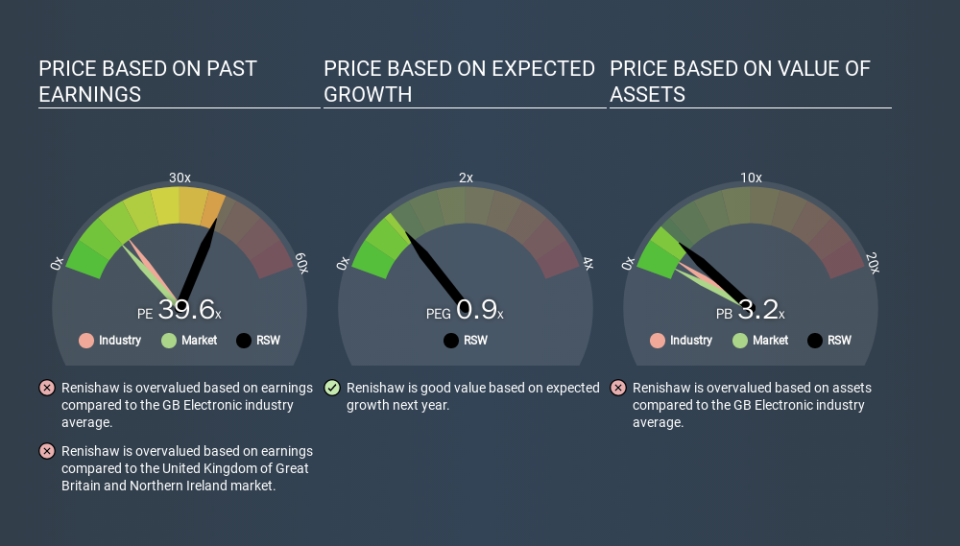How Does Renishaw's (LON:RSW) P/E Compare To Its Industry, After The Share Price Drop?

To the annoyance of some shareholders, Renishaw (LON:RSW) shares are down a considerable 44% in the last month. Indeed the recent decline has arguably caused some bitterness for shareholders who have held through the 39% drop over twelve months.
All else being equal, a share price drop should make a stock more attractive to potential investors. While the market sentiment towards a stock is very changeable, in the long run, the share price will tend to move in the same direction as earnings per share. So, on certain occasions, long term focussed investors try to take advantage of pessimistic expectations to buy shares at a better price. Perhaps the simplest way to get a read on investors' expectations of a business is to look at its Price to Earnings Ratio (PE Ratio). A high P/E implies that investors have high expectations of what a company can achieve compared to a company with a low P/E ratio.
Check out our latest analysis for Renishaw
How Does Renishaw's P/E Ratio Compare To Its Peers?
Renishaw's P/E of 34.80 indicates some degree of optimism towards the stock. As you can see below, Renishaw has a higher P/E than the average company (14.7) in the electronic industry.
Its relatively high P/E ratio indicates that Renishaw shareholders think it will perform better than other companies in its industry classification. Clearly the market expects growth, but it isn't guaranteed. So further research is always essential. I often monitor director buying and selling.
How Growth Rates Impact P/E Ratios
Companies that shrink earnings per share quickly will rapidly decrease the 'E' in the equation. That means unless the share price falls, the P/E will increase in a few years. So while a stock may look cheap based on past earnings, it could be expensive based on future earnings.
Renishaw saw earnings per share decrease by 63% last year. And over the longer term (5 years) earnings per share have decreased 16% annually. This could justify a pessimistic P/E.
A Limitation: P/E Ratios Ignore Debt and Cash In The Bank
One drawback of using a P/E ratio is that it considers market capitalization, but not the balance sheet. That means it doesn't take debt or cash into account. The exact same company would hypothetically deserve a higher P/E ratio if it had a strong balance sheet, than if it had a weak one with lots of debt, because a cashed up company can spend on growth.
Such expenditure might be good or bad, in the long term, but the point here is that the balance sheet is not reflected by this ratio.
How Does Renishaw's Debt Impact Its P/E Ratio?
Since Renishaw holds net cash of UK£61m, it can spend on growth, justifying a higher P/E ratio than otherwise.
The Verdict On Renishaw's P/E Ratio
Renishaw trades on a P/E ratio of 34.8, which is multiples above its market average of 11.2. Falling earnings per share is probably keeping traditional value investors away, but the net cash position means the company has time to improve: and the high P/E suggests the market thinks it will. What can be absolutely certain is that the market has become significantly less optimistic about Renishaw over the last month, with the P/E ratio falling from 62.2 back then to 34.8 today. For those who prefer to invest with the flow of momentum, that might be a bad sign, but for a contrarian, it may signal opportunity.
Investors have an opportunity when market expectations about a stock are wrong. If the reality for a company is better than it expects, you can make money by buying and holding for the long term. So this free visualization of the analyst consensus on future earnings could help you make the right decision about whether to buy, sell, or hold.
Of course you might be able to find a better stock than Renishaw. So you may wish to see this free collection of other companies that have grown earnings strongly.
If you spot an error that warrants correction, please contact the editor at editorial-team@simplywallst.com. This article by Simply Wall St is general in nature. It does not constitute a recommendation to buy or sell any stock, and does not take account of your objectives, or your financial situation. Simply Wall St has no position in the stocks mentioned.
We aim to bring you long-term focused research analysis driven by fundamental data. Note that our analysis may not factor in the latest price-sensitive company announcements or qualitative material. Thank you for reading.

 Yahoo Finance
Yahoo Finance 
